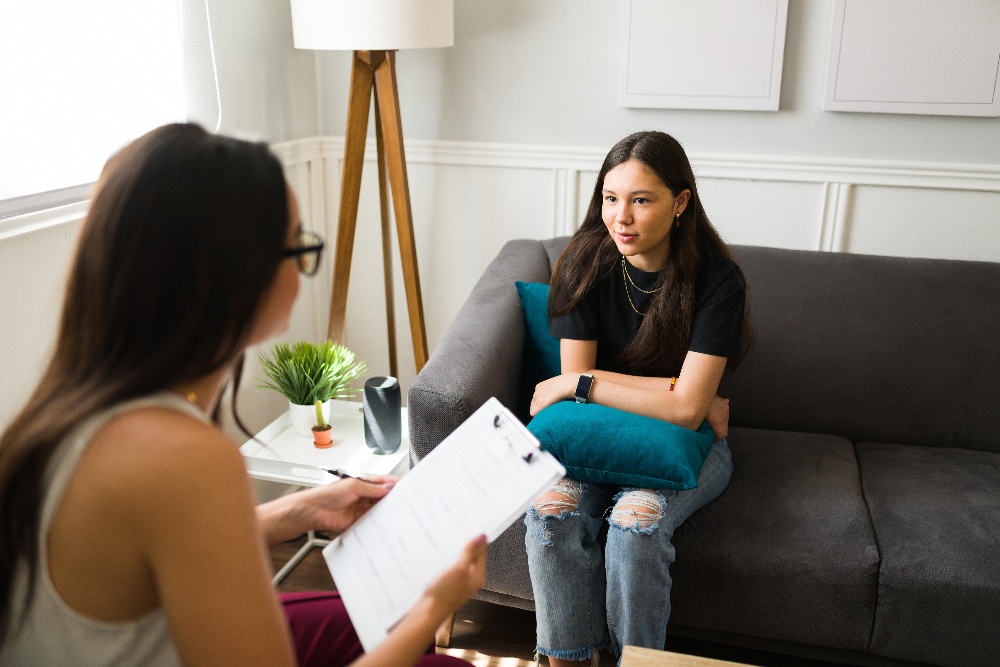Anxiety in Teens: How Cognitive Behavioral Therapy Can Help
As a parent of a teen with anxiety, you want to do everything you can to help them. Cognitive behavioral therapy (CBT) is one of the most effective treatments for reducing anxiety in teens. This type of therapy focuses on changing negative thought patterns and behaviors that contribute to anxiety. Here is an overview of how CBT works and why it is so beneficial for anxious teens.

Table Of Content
- Understanding Anxiety in Teens
- How Cognitive Behavioral Therapy Works
- The Benefits of CBT for Anxious Teens
Understanding Anxiety in Teens
Anxiety disorders are among the most common mental health issues affecting teens today. According to the National Institute of Mental Health, over 30% of adolescents aged 13-18 will experience an anxiety disorder at some point. The most prevalent types of anxiety in teens are:
- Generalized anxiety disorder: Excessive worrying about everyday issues
- Social anxiety: Extreme fear of being embarrassed or judged in social situations
- Separation anxiety: Intense fear about being away from parents/caregivers
- Phobias: Irrational fears about specific objects or situations
- Panic attacks: Sudden periods of overwhelming fear accompanied by physical symptoms
Anxiety can significantly impact a teen's quality of life. It can interfere with school, activities, relationships and overall emotional wellbeing. The good news is that cognitive behavioral therapy has been found highly effective at treating anxiety in teens.
How Cognitive Behavioral Therapy Works
Cognitive behavioral therapy is a short-term, goal-focused treatment that aims to change negative thought and behavior patterns. A key component of CBT is teaching teens to recognize irrational or exaggerated ways of thinking that trigger their anxiety. Some common anxious thoughts are:
- "Everyone will laugh at me if I mess up my speech" (social anxiety)
- "As soon as my parents leave, something terrible will happen" (separation anxiety)
- "I'm going to fail this test and flunk out of school" (generalized anxiety)
CBT helps teens understand that their anxious thoughts are distortions, not reality. Teens learn to identify their own anxious thinking patterns and reframe their thoughts in a more realistic, positive way. This "cognitive restructuring" process reduces anxiety.
Along with changing thought patterns, CBT also focuses on facing fears gradually and learning calming strategies. For example, a teen with social anxiety may start by making small talk with close friends they are comfortable with before working up to talking to acquaintances. Breathing exercises and progressive muscle relaxation techniques help calm the physical symptoms of anxiety.
As teens master CBT skills, they gain greater confidence in managing anxiety triggers. CBT also gives teens tools to prevent anxiety from coming back once treatment ends.
The Benefits of CBT for Anxious Teens
Several factors make cognitive behavioral therapy well-suited for treating anxiety in teens:
- Collaborative approach: CBT is interactive and teaches self-help strategies teens can use anytime. Teens play an active role in setting treatment goals.
- Skill-building: Teens learn specific skills to directly combat anxiety-provoking thoughts and behaviors. This gives them a sense of control.
- Short-term: CBT is brief, lasting 10-20 sessions on average. This fits with teens' busy schedules and short attention spans.
- Long-lasting: Studies show that 70-80% of anxious teens who undergo CBT experience reduced symptoms for at least one year after ending treatment.
- Age-appropriate: CBT uses examples and scenarios relevant to teens' lives, like school, friends and social media. Teens are more open to applying CBT skills.
- Customizable: CBT programs can be adapted to target a teen's specific anxiety disorder and situation. This personalized approach maximizes outcomes.
- Accessible: CBT is cost-effective and available in multiple formats like individual and group therapy, self-help workbooks and online programs.
By directly addressing distorted thinking patterns and unhelpful behaviors that drive anxiety, CBT equips teens with concrete ways to manage symptoms. The coping skills teens learn can benefit them into adulthood as well. If your teen is struggling with anxiety, consider cognitive behavioral therapy as an effective treatment option.
